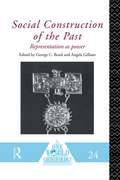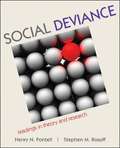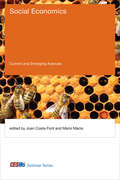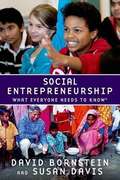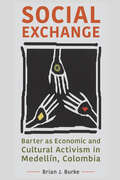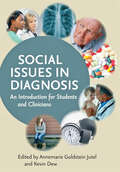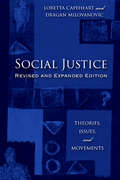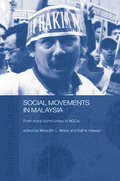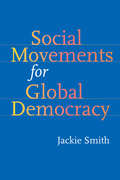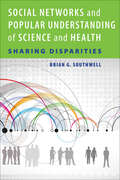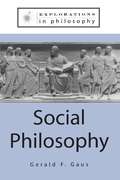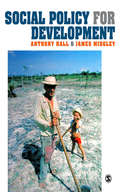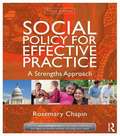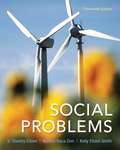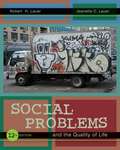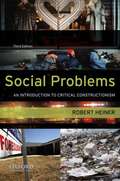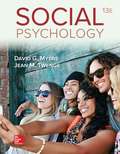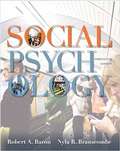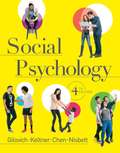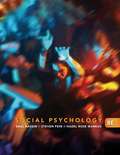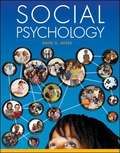- Table View
- List View
Social Construction of the Past: Representation as Power (One World Archaeology)
by George Clement Bond Angela GilliamFirst published in 1994. Anthropological and archaeological enquiry are shaped by the historical times in which they are formulated. This collection of essays examines how mainstream scholarship constructs the past - in the case of anthropologists, usually the past of other peoples. By creating another people's cultural history, scholars appropriate it and turn it into a form of domination by one group over another. Mainstream scholarship has often failed to recognize the intellectual and scholarly contribution of subjugated peoples . This volume looks at the way 'postcolonial' scholars are redefining the nature of scholarship, and themselves, in order to develop a more egalitarian discourse. Social Constructions of the Past examines labour, race and gender and its relationship to power and class. It includes essays on a broad range of topics, from the role of intellectuals in restructuring a non-apartheid South Africa, to Haitian working-class women using sexuality to resist domination.
Social Deviance: Readings In Theory And Research
by Stephen M. Rosoff Henry N. PontellIn its first edition with McGraw-Hill, this comprehensive source of classic and contemporary readings will help students learn who becomes deviant, why people become deviant, and how individual and institutional reactions help define the social reality of deviants (the persons) and deviance (the behavior). The selected readings provide experiences for students by providing a solid foundation in the field and a means by which to examine contemporary issues.
Social Economics: Current and Emerging Avenues (CESifo Seminar Series)
by Joan Costa-Font Mario MacisA rich collection of current research in the growing field of social economics, covering such issues as culture, gender, ethics, and philanthropic behavior.The growing field of social economics explores how individual behavior is affected by group-level influences, extending the approach of mainstream economics to include broader social motivations and incentives. This book offers a rich and rigorous selection of current work in the field, focusing on some of the most active research areas. Topics covered include culture, gender, ethics, and philanthropic behavior.Social economics grows out of dissatisfaction with a purely individualistic model of human behavior. This book shows how mainstream economics is expanding its domain beyond market and price mechanisms to recognize a role for cultural and social factors. Some chapters, in the tradition of Gary Becker, attempt to extend the economics paradigm to explain other social phenomena; others, following George Akerlof's approach, incorporate sociological and psychological assumptions to explain economic behavior. Loosely organized by theme—Social Preferences; Culture, Values, and Norms; and Networks and Social Interactions”—the chapters address a range of subjects, including gender differences in political decisions, “moral repugnance” as a constraint on markets, charitable giving by the super-rich, value diversity within a country, and the influence of children on their parents' social networks.ContributorsMireia Borrell-Porta, Sjoerd Beugelsdijk, Joan Costa-Font, Elwyn Davies, Julio Jorge Elias, Marcel Fafchamps, Luigi Guiso, Odelia Heizler, Ayal Kimhi, Mariko J. Klasing, Martin Ljunge, Mario Macis, Mark Ottoni-Wilhelm, Abigail Payne, Kelly Ragan, Jana Sadeh, Azusa Sato, Kimberley Scharf, Sarah Smith, Mirco Tonin, Michael Vlassopoulos, Evguenia Winschel, Philipp Zahn
Social Entrepreneurship: What Everyone Needs to Know
by David Bornstein Susan DavisOffering a first general overview of social entrepreneurship, it explains what social entrepreneurs are, how their organizations function, what challenges they face and an understanding of what differentiates social entrepreneurship from standard business ventures.
Social Exchange: Barter as Economic and Cultural Activism in Medellín, Colombia
by Brian J. BurkeMoney occupies a powerful place in our lives – it is a problem, a goal, and motivator, a measure of self-worth and national progress, and even an influence on how we relate to each other and to nature – but what happens when communities start to reinvent money and markets? Over the last twenty-five years, grassroots activists in Medellín, Colombia, have used barter markets and community currencies as one strategy to re-weave a social fabric shredded by violence and to establish an economy founded on respect and reciprocity rather than exploitation. In Social Exchange, Brian J. Burke provides a deep ethnographic investigation of this activism and its effects. This story draws us into the cultural and material effects of capitalism and narco-violence, while also helping us understand what new radical imaginations look like and how people bring them to life. The result is an intimate glimpse of urban life in Latin America, as well as a broader analysis of non-capitalist or post-capitalist possibility.
Social Inequality: Forms, Causes, And Consequences
by Charles E. HurstA broad introduction to inequality both nationally and internationally. This text is intended as a broad introduction to the many types of inequality in U. S. society and in the global setting. The authors provide a wide range of explanations on inequality and offering analyses of policy attempts to address these issues. The text provides data from the latest research in its discussions of economic, status, political, gender, sexual, and racial/ethnic inequalities.
Social Issues in Diagnosis: An Introduction for Students and Clinicians
by Annemarie Goldstein Jutel and Kevin DewUnderstanding the social process of diagnosis is critical to improving doctor-patient relationships and health outcomes.Diagnosis, the classification tool of medicine, serves an important social role. It confers social status on those who diagnose, and it impacts the social status of those diagnosed. Studying diagnosis from a sociological perspective offers clinicians and students a rich and sometimes provocative view of medicine and the cultures in which it is practiced. Social Issues in Diagnosis describes how diagnostic labels and the process of diagnosis are anchored in groups and structures as much as they are in the interactions between patient and doctor.The sociological perspective is informative, detailed, and different from what medical, nursing, social work, and psychology students—and other professionals who diagnose or work with diagnoses—learn in a pathophysiology or clinical assessment course. It is precisely this difference that should be integral to student and clinician education, enriching the professional experience with improved doctor-patient relationships and potentially better health outcomes.Chapters are written by both researchers and educators and reviewed by medical advisors. Just as medicine divides disease into diagnostic categories, so have the editors classified the social aspects of diagnosis into discrete areas of reflection, including• Classification of illness• Process of diagnosis• Phenomenon of uncertainty• Diagnostic labels• Discrimination• Challenges to medical authority• Medicalization• Technological influences• Self-diagnosisAdditional chapters by clinicians, including New York Times columnist Lisa Sanders, M.D., provide a view from the front line of diagnosis to round out the discussion. Sociology and pre-med students, especially those prepping for the new MCAT section on social and behavioral sciences, will appreciate the discussion questions, glossary of key terms, and CLASSIFY mnemonic.
Social Justice: Theories, Issues, and Movements (Revised and Expanded Edition) (Critical Issues in Crime and Society)
by Dragan Milovanovic Loretta CapeheartAn eye for an eye, the balance of the scales – for centuries, these and other traditional concepts exemplified the public’s perception of justice. Today, popular culture, including television shows like Law and Order, informs the public’s vision. But do age-old symbols, portrayals in the media, and existing systems truly represent justice in all of its nuanced forms, or do we need to think beyond these notions? The second edition of Social Justice: Theories, Issues, and Movements responds to the need for a comprehensive introduction to these issues. Theories of social justice are presented in an accessible fashion to encourage engagement of students, activists, and scholars with these important lines of inquiry. Issues are analyzed utilizing various theories for furthering engagement in possibilities. Struggles for justice -- from legal cases to on the ground movements -- are presented for historical context and to inform the way forward.
Social Morality in Islam: An Introductory Guide for Young Readers
by Asim SarkA believer reads to retain his liveliness. The readings will be constant and regular. For those who share the same goals, coming together and discussing books will increase the benefits. Those people who renew themselves and strengthen their faith within the written word will be firmer in their resistance against withering.Reading works that will make one closer to Allah the Almighty is praiseworthy. Even more commendable is to take one's reading beyond theory by seeking ways to bring one's knowledge into practice, for one's servanthood depends on daily improving one's performance. The essence of knowledge is practice, and its purpose is to come closer to the All-Compassionate.&“Islam is high morality&” says Prophet Muhammad, peace and blessings be upon him. The Messenger of Allah, who is a paragon of virtue, prefers people with good manners. This book, which is an introductory guide for young readers, focuses on the necessity of acquiring fine morals, the rights of parents, honesty, and etiquettes and manners in social relations.
Social Movement Malaysia: From Moral Communities To Ngos
by Meredith L. Weiss Saliha HassanThis book considers the proliferation in Malaysia over the past two decades of non-governmental organizations (NGOs) associated with various social movements, both to provide basic information about the NGOs and social movements, and to discuss their role in the development of civil society generally in particular their contribution to the reform movement, which has been gathering strength since 1998. The book discusses the nature and development of the movements, and shows that those movements concerned with human rights and women's issues have made significant contributions to the reform movement and been irrevocably changed by their involvement in it.
Social Movements for Global Democracy (Themes in Global Social Change)
by Jackie SmithHonorable Mention, 2010 Book Award, Global Division, Society for the Study of Social ProblemsHonorable Mention, 2010 PEWS Book Award, Political Economy of the World-System section of the American Sociological AssociationThis groundbreaking study sheds new light on the struggle to define the course of globalization. Synthesizing extensive research on transnational activism, Social Movements for Global Democracy shows how transnational networks of social movement activists—democratic globalizers—have worked to promote human rights and ecological sustainability over the predominant neoliberal system of economic integration.Using case studies of recent and ongoing campaigns for global justice, Jackie Smith provides valuable insight into whether and how these activists are succeeding. She argues that democratic globalizers could be more effective if they presented a united front organized around a global vision that places human rights and ecological stability foremost and if they were to directly engage governments and the United Nations.Illuminating the deep-seated struggles between two visions of globalization, Smith reveals a network of activists who have long been working to democratize the global political system.
Social Movements in Malaysia: From Moral Communities to NGOs
by Meredith L. Weiss Saliha HassanThis book considers the proliferation in Malaysia over the past two decades of non-governmental organisations (NGOs) associated with various social movements, both to provide basic information about the NGOs and social movements, and to discuss their role in the development of civil society generally in particular their contribution to the reform movement, which has been gathering strength since 1998. The book discusses the nature and development of the movements, and shows that those movements concerned with human rights and women's issues have made significant contributions to the reform movement and been irrevocably changed by their involvement in it.
Social Networks and Popular Understanding of Science and Health: Sharing Disparities
by Brian G. SouthwellA data-driven analysis of how different people share information about health through social media.Using social media and peer-to-peer networks to teach people about science and health may seem like an obvious strategy. Yet recent research suggests that systematic reliance on social networks may be a recipe for inequity. People are not consistently inclined to share information with others around them, and many people are constrained by factors outside of their immediate control. Ironically, the highly social nature of humankind complicates the extent to which we can live in a society united solely by electronic media.Stretching well beyond social media, this book documents disparate tendencies in the ways people learn and share information about health and science. By reviewing a wide array of existing research—ranging from a survey of New Orleans residents in the weeks after Hurricane Katrina to analysis of Twitter posts related to H1N1 to a physician-led communication campaign explaining the benefits of vaginal birth—Brian G. Southwell explains why some types of information are more likely to be shared than others and how some people never get exposed to seemingly widely available information.This book will appeal to social science students and citizens interested in the role of social networks in information diffusion and yet it also serves as a cautionary tale for communication practitioners and policymakers interested in leveraging social ties as an inexpensive method to spread information.
Social Philosophy (Explorations In Philosophy Ser.)
by Gerald F. GausThis accessible introductory text discusses how people in a pluralistic society such as ours can accept a common social ethic - a publicly justified morality. It presents analyses of the basic concepts, including justifications of liberty, harm to others, private property rights, distributive justice, environmental harms, help to others and offensive behaviour. Gaus acquaints the reader with the major figures in social philosophy - John Stuart Mill, Jeremy Bentham, Thomas Hobbes, John Locke, David Hume, John Rawls, David Gauthier, and Joel Feinberg - as well as recent communitarian philosophers. The basic technical aspects of social philosophy are also introduced: game theory, social choice theory, the ideas rational action, rational bargaining, and public goods. Throughout, helpful short examples and stories are used to illustrate the material.
Social Policy for Development
by James Midgley Anthony Hall'Strong social policy is essential for sustainable growth. This book is an extremely useful overview of social policy issue for policy makers and anyone who wants to understand the true roots of successful sustainable development' - Ian Johnson, Vice President for Sustainable Development, The World Bank 'Throughout the world issues of social development have now taken centre stage. There is no more comprehensive and readable guide to the choices and conflicts of this global drama. This book is essential reading for all students and practitioners of social development - and for every World Bank economist' - David Piachaud, Professor of Social Policy, London School of Economics This much-needed textbook fulfils a major gap in providing a complete up-to-date guide and introduction to the increasingly important role of social policy in the context of development processes and practice. Across a number of key sectors and areas of social policy concern, the authors accessibly introduce and explain the main conceptual debates, the most recent policy discussions, and provide applied examples to illustrate the latest developments in the social policy and planning field. Central topics covered include: - poverty - rural development - urban development - education - health - social work - social welfare - international development and cooperation. Social Policy for Development is an essential text for all students and practitioners alike seeking a deeper understanding of the issues of poverty, social exclusion and deprivation across social policy and development studies internationally.
Social Policy for Effective Practice
by Rosemary ChapinFor use as a text in foundations generalist social policy courses, either at the baccalaureate or master's level, this book examines the process of defining need, analyzing social policy, and developing new policy. A clear philosophical base and a common theoretical framework underlie the discussion of each component of the policy process. Four themes are interwoven throughout the book: the importance of thinking critically about social policy, the benefits of using the strengths perspective in policy analysis and development, the critical role social policy plays in all areas of practice, and the absolute responsibility of every social worker to engage in policy practice. Routledgesw.com now contains 6 cases; the Sanchez Case has been revised to include much more policy content. Instructor materials include extra readings, PowerPoints, test questions, annotated links, syllabi, and EPAS guidelines. The book is also customizable on Routledge Custom Gateway.
Social Problems (Thirteenth Edition)
by D. Stanley Eitzen Kelly Eitzen Smith Maxine Baca ZinnTaking a conflict approach, Social Problems, 13e examines social problems, how they are interrelated to other problems, and society's role in their creation and perpetuation. This text addresses interesting subjects, such as corporate crime, urban decay, poverty and the changing economy. The thirteenth edition focuses more deliberately on five major themes: the structural sources of social problems; the role of the United States in global social problems; the centrality of class, race, gender, sexuality, and disability as sources of division, inequality, and injustice; the critical examination of society; and solutions to social problems. MySocLab is an integral part of the Eitzan / Zinn / Smith program. Key learning applications include MySocLab Videos, Social Explorer and Sociology in Focus Blog. Teaching & Learning Experience Personalize Learning - MySocLab is an online homework, tutorial, and assessment program. It helps students prepare for class and instructor gauge individual and class performance. Improve Critical Thinking - Chapter organization follows a logical framework that traces a problem from its origin to solution. Engage Students - International, national, and personal examples help students understand issues better. Explore Theory - Major sociological theories within context of social problem are discussed. Understand Diversity - Features help students think globally about defining a solution to social problems. Support Instructors - A number of Instructor Resources including PowerPoint Presentations, MyTest Test Bank, and Instructor's Manual.0205949185 / 9780205949182 Social Problems Plus NEW MySocLab with eText -- Access Card Package Package consists of: 0205206530 / 9780205206537 NEW MySocLab with Pearson eText -- Valuepack Access Card 1-095 Pub 0205881882 / 9780205881888 Social Problems
Social Problems and the Quality of Life
by Jeanette C. Lauer Robert H. LauerSocial Problems and the Quality of Life focuses on the ways in which social problems affect the quality of life. It begins by defining social problems and discussing the tools needed to understand and respond to problems. It then moves on to an examination of specific problems in terms of: the nature and extent of the problem; how the problem affects people's quality of life; the structural and social psychological factors that cause and tend to perpetuate the problem; and what can be done to resolve the problem. Along with the discussion, a number of learning aids makes this text personal, practical, and an interactive learning experience.
Social Problems: An Introduction to Critical Constructionism (3rd Edition)
by Robert HeinerNow in a new edition, Social Problems: An Introduction to Critical Constructionism synthesizes conflict theory and social constructionism to help students think critically about social problems. A concise, student-friendly alternative to all-encompassing standard textbooks, this book examines a single theoretical paradigm in depth, demonstrating how theory can be used to understand a breadth of real world structures. Robert Heiner focuses on the four problems most often encountered in social problems courses: inequality, family, crime and deviance, and overpopulation and the environment. Heiner's critical approach helps students conceive of societal problems as socially constructed phenomena whose importance varies according to media attention and the agendas of particular interest groups. Furthermore, his critical point of view leads students to reevaluate their own preconceived notions and beliefs, in turn generating lively classroom discussions. Revised and updated in this third edition, Social Problems now includes a glossary of key terms and reinforcing end-of-chapter questions, as well as new discussions of such issues as immigration. Additional graphics help visually illustrate key concepts and ideas. Social Problems: An Introduction to Critical Constructionism, Third Edition, is ideal for social problems courses. Given its readability and consistent application of theory, this book could also be used in introductory sociology courses and social theory courses.
Social Psychology
by David Myers Jean TwengeSocial Psychology introduces students to the science of us: our thoughts, feelings, and behaviors in a social world. By studying social psychology, students learn to think critically about everyday behaviors and they gain an appreciation for how we view and affect one another. <p><p> Social Psychology's conversational voice allows students to access and enjoy this relatively young and exciting science. In Social Psychology, students find scientific explorations of love and hate, conformity and independence, prejudice and helping, persuasion and self-determination. <p> Social Psychology focuses on how people view, affect, and relate to one another. Beginning with its chapter-opening stories, the text relates the theme of the chapter to the human experience. The cutting edge of social psychological research is also at the forefront, with more than 450 new or updated citations since the last edition.
Social Psychology
by Don Byrne Robert Baron Nyla BranscombeShow how the ever-changing field of Social Psychology is useful in students’ everyday lives. The integration of application into the main body chapters helps students see the connection between theory and real world experiences. This classic text retains the hallmark of its own past success: up-to-date coverage of the quickly evolving subject matter written in a lively manner that has been embraced by hundreds of thousands of students around the world. This book continues to balance its coverage of fundamentals with current research.
Social Psychology (4th edition)
by Thomas Gilovich Richard E. Nisbett Dacher Keltner Serena ChenA dynamic introduction to the science, relevance, and excitement of today's social psychology.Written by four award-winning teachers and researchers who represent the breadth and depth of the field, Social Psychology, Fourth Edition, encourages students to become critical thinkers about the research, theories, and applications of social psychology.
Social Psychology (Eighth Edition)
by Saul Kassin Steven Fein Hazel Rose MarkusDistinguished by its current-events emphasis, strong diversity coverage, and engaging connections drawn between social psychology and students' everyday lives, Social Psychology, Eighth Edition, remains one of the most scholarly and well-written texts in its field. Integrating classic and contemporary research, the text also includes comprehensive coverage of social cognition and evolutionary psychology, and features authoritative material on social psychology and the law. For this edition, Saul Kassin and Steven Fein welcome Hazel Rose Markus to the author team. In addition, coverage of culture and diversity are integrated into every chapter by Hazel Rose Markus, a leader and respected researcher in the study of cultural psychology.
Social Psychology (Eleventh Edition)
by David MyersReflecting your students and their world. How many of the students in your Social Psychology course are Psychology majors? Business? Sociology? Education? In the 11th edition of Social Psychology, David Myers once again weaves an inviting and compelling narrative that speaks to ALL of your students regardless of background or intended major. And with Connect Social Psychology and LearnSmart, students are able to create a personalized learning plan helping them be more efficient and effective learners. With LearnSmart, students know what they know and master what they don't know and faculty are able to move to more in-depth classroom discussions. Through examples and applications as well as marginal quotations from across the breadth of the liberal arts and sciences, Myers draws students into the field of social psychology. At the same time, Myers is also in tune with the ever-changing state of social psychology research. Research Close-Up and Inside Story features throughout the book provide deeper exposure to key research and researchers. Marginal quotations, examples and applications throughout each chapter, and the concluding "Applying Social Psychology" chapters all ensure that regardless of your students' interests and future plans, Social Psychology will engage them. This 11th edition also features the contributions of Jean Twenge, author of Generation Me and The Narcissism Epidemic, further bolstering the direct connection to today's students.
Social Psychology (Ninth Edition)
by Saul Kassin Steven Fein Hazel Rose MarkusDistinguished by its current-events emphasis, the aim to bring the outside world into the field of social psychology, strong diversity coverage, and engaging connections drawn between social psychology and everyday life, SOCIAL PSYCHOLOGY, Ninth Edition, remains one of the most scholarly and well-written books in its field. Integrating classic and contemporary research, the book also includes comprehensive coverage of social cognition and evolutionary psychology, and features authoritative material on social psychology and the law. Coverage of culture and diversity is integrated into every chapter by Hazel Rose Markus, a leader and respected researcher in the study of cultural psychology.
